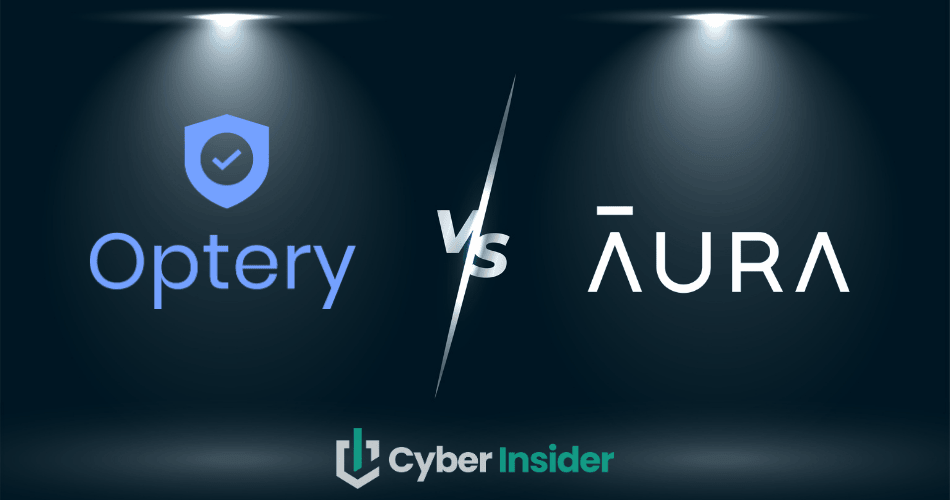
Your personal data is scattered across hundreds of shady broker sites, ready to be sold to advertisers — or worse, scammers. That’s where services like Aura and Optery step in, promising to wipe your digital footprints clean. So, in the ever-growing fight against data brokers in 2026, is Aura or Optery the smarter choice?
On the surface, both sound like lifesavers. Aura pitches itself as an all-in-one security suite with identity theft protection, VPN, antivirus, and, yes, automated data removal. Optery, on the other hand, is laser-focused on exposing exactly where your data lives and showing you proof when it’s gone. One goes for convenience, the other for transparency. But dig a little deeper, and the differences start to get interesting.
In fact, one of these tools was noticeably faster at removing our personal info from people-search sites — while the other impressed us with detailed reports and ongoing monitoring. If you can’t wait to see the breakdown, you can skip ahead to our hands-on removal results.
| Optery | Aura | |
| Website | Optery.com | Aura.com |
| Availability | The US only | The US only |
| Coverage | 120+ – 640+ (varies) | 140+ (across all plans) |
| Support | Live chat, email, email and social media, and knowledge base | US-based phone support, live chat, Help Center |
| Price | From $3.25 to $30/month (custom plans too) | $12 – $30/month ($9 with coupon) |
| Best deal | 17% off on annual plans | 68% Off Coupon > |
Highlights from our Optery and Aura comparison
- Aura shines as a comprehensive, all-in-one cybersecurity suite. Beyond data removal, it packs in identity theft protection, credit monitoring, VPN, and more — making it especially appealing for families who want a single solution that covers everything.
- Optery, on the other hand, takes a hyper-focused approach to data removal. With coverage across 640+ data brokers and options for customizable removal requests, it’s perfect for anyone who wants a highly tailored, transparency-first privacy solution.
- Both companies play by the privacy rulebook, but there’s a noticeable difference in support. Aura provides 24/7 customer service, while Optery’s support is more limited — a detail that can shape the overall user experience.
Aura and Optery at a glance: Which company is more trustworthy?
Trust is the deciding factor in data removal. Aura brings the full security package, but Optery sets itself apart with tailored removals and proof-driven transparency.
Aura Data Removal: All-in-one protection with a unique touch

| Starting price | $12 ($9 with coupon) |
| Data broker coverage | 140+ (no custom requests) |
| Availability | US-only |
| Extra security and privacy features | Identity theft protection, VPN, antivirus, password manager, credit monitoring, parental controls, and $1M insurance per person |
| Best deal | 68% Off Coupon > |
Aura isn’t just another data removal tool — it’s more like an online security command center. The platform scans 140+ data brokers and people-search sites, filing opt-out requests automatically and keeping watch so your information doesn’t sneak back online. Since data brokers love to re-list your info, Aura re-scans and re-submits requests in the background, sparing you the endless paperwork.
What makes Aura stand out is its easy-to-use dashboard, which shows you every request in progress, completed, or pending. Over time, that translates into fewer robocalls, less spam, and fewer creepy strangers knowing your home address. Families in particular will appreciate Aura’s broader security suite, which bundles in identity theft protection, credit monitoring, VPN, antivirus, password manager, and even parental controls — all wrapped in one subscription.
Of course, Aura isn’t perfect. It currently focuses on US dauta brokers and covers fewer sites than specialized rivals like Incogni or DeleteMe. But if you want more than just removals — a full suite of privacy and security tools plus $1 million identity theft insurance — Aura is one of the most compelling all-in-one packages out there.
+ Pros
- Automated and recurring removals
- Part of a strong digital security suite
- Covers 140+ data broker and people-search sites
- Credit lock feature
- User-friendly dashboard and app
- VPN and antivirus bundled in
- Includes dark web monitoring, spam filtering, and $1 million identity theft insurance
- 24/7 US-based support
- Family plan covers five adults and unlimited kids
- Strong security with AES-256 encryption
– Cons
- Focused on US data brokers
- Covers fewer data brokers than dedicated services like Incogni and DeleteMe
- Dashboard can feel crowded with many features
- Does not remove data from social media, blogs, or Google search directly
Optery: Privacy on your terms

| Starting price | $3.25/month |
| Data broker coverage | 120 – 640+ (depend on the plan) |
| Availability | The US only |
| Extra security and privacy features | Free exposure report and DIY removal guides |
| Best deal | 17% off on annual plans |
Optery takes a different path than Aura — focusing purely on data broker removal with a level of customization most competitors don’t offer. Instead of just sweeping through a standard list, Optery lets you decide which brokers to target. With coverage of 640+ data brokers and people-search sites, including both well-known names and obscure players, it gives you more control over your digital footprint than most services on the market.
One of Optery’s biggest strengths is transparency. Every paid plan comes with a detailed removals report, complete with before-and-after screenshots so you can actually see where your data was removed. Even the free plan has value, offering an “Exposure Report” that shows where your personal info is floating around online — perfect if you want a peek before committing.
Optery also mixes tech and human effort to get the job done. AI-driven automation handles the bulk of opt-out requests, while higher-tier plans add manual removals for tricky cases. The result? A thorough, flexible service that appeals to users who want both proof and peace of mind.
The trade-off is price: Optery’s higher-tier plans can be more expensive than rivals, and some of its best features are locked behind premium subscriptions. But for anyone serious about scrubbing their info off the web, Optery delivers one of the most meticulous approaches you’ll find.
+ Pros
- 30-day money-back guarantee
- Comprehensive coverage of over 270 data brokers and people search sites
- Intuitive and easy-to-use interface
- Premium plan data removal request
- Step-by-step opt-out guides
- Utilizes strong AES-256-bit encryption for data security
– Cons
- Full broker network is locked behind tiers
- Paid subscription is pricier than with some competitors
- Limited free features
Data removal process: How Aura and Optery remove your data from the internet
When it comes to data removal, the method matters as much as the results. Both Aura and Optery rely on automation to sweep through hundreds of data broker and people-search sites, sending opt-out requests on your behalf and keeping an eye out for reappearances. But the way they execute the process — and the level of control they give you — sets them apart.
| Aura | Optery | |
| Primary focus | All-in-one digital security suite with data removal built in | Specialized data broker removal service |
| Automation | Fully automated, minimal input needed | Automated, with human oversight for complex cases on higher plans |
| Coverage | 140+ data brokers (across all pans) | 120+ on entry plan, up to 640+ with Expanded Reach |
| Custom removals | ❌ Currently not available | ✅ Available on “Ultimate” plan (unlimited requests) |
| Reporting | Dashboard updates on removal progress | Quarterly reports with before-and-after screenshots |
The shared core process
No matter which service you choose, the backbone of data removal follows the same pattern:
- You provide your details – Both services need your basic info (name, email, phone number, address) to track down your data.
- Scanning begins – Advanced algorithms and search technology scan hundreds of data broker and people-search sites for your exposed information.
- Opt-out requests are filed – Automated requests are sent on your behalf, legally compelling data brokers to remove your records.
- Data is deleted – Depending on the broker, this can take days to weeks, and you may or may not receive confirmation.
- Ongoing monitoring – Since data often reappears, both Aura and Optery rescan regularly and resubmit requests when needed.
- Reports and updates – Each service keeps you informed, though Aura does this via its dashboard, while Optery provides detailed proof-of-removal reports.
Where they diverge
- Aura keeps things simple with a set-it-and-forget-it automated system, ideal for people who want removals to run quietly in the background as part of a bigger security package.
- Optery, on the other hand, doubles down on transparency and precision. Its higher-tier plans add human oversight for tricky removals and offer before-and-after screenshots so you can see proof that your data is gone.
In short, Aura makes removals effortless, while Optery gives you more proof and control — it’s a matter of choosing convenience versus transparency.
Privacy compliance and regulations
When you sign up for data removal, you’re handing over the keys to your digital life — so how do Aura and Optery treat that trust?
Aura ticks the big boxes with GDPR/CCPA compliance and ISO 27001 + SOC 2 Type II certifications. It’s secure, no doubt. But here’s the catch: Aura’s policy allows your info to be used for targeted ads unless you opt out. It’s safe, but not always squeaky clean on transparency.
Optery takes the stricter path with a hard no-sell policy — your data is never rented, sold, or used for ads. Its SOC 2 Type II audit backs this up, and its free plan doesn’t even ask for billing info. Plus, it explains everything in plain English, no legal headache required.
Availability: Which service covers more countries?
If you’re outside the US, this might be the dealbreaker. Aura’s data removal service is locked to the United States, with a few extra security tools (like its antivirus) extending into Canada. But its core features — identity theft protection, credit monitoring, and broker removals — are US-only.
Optery stretches a bit further. Its personal and family plans work in both the US and Canada (every province except Quebec). On top of that, Optery’s business plans can serve international customers in select countries if the subscription volume is high enough.
Aura vs Optery feature comparison: What sets them apart?
Aura is all about value and bundled protection, while Optery wins points for its massive broker reach and proof-driven removals.
Now, let’s break down their key features side by side.
Data broker coverage
When it comes to data removal, coverage is everything. The more brokers a service can reach, the fewer places your personal details can hide. Aura keeps things simple with automated removals from about 140 of the most common US-based data broker sites, focusing on the big names like TruthFinder and Nuwber.
Optery, on the other hand, plays in a different league. Depending on your plan, it can tackle anywhere from 120 brokers all the way up to 1,360+ sites with its “Ultimate” plan and Expanded Reach option. That includes not just the major players but also niche and lesser-known brokers, with quarterly reports and even custom removals available on higher tiers.
Custom removal requests
Sometimes privacy needs a personal touch. That’s where custom removal requests come in — and this is where Optery clearly takes the lead. With its “Ultimate” plan, you can submit specific URLs for data brokers not already on its list, letting Optery make a “best-effort” attempt to scrub your information from those sites. It’s a powerful option for anyone who wants to chase down every last trace of their data online.
Aura doesn’t offer custom removal requests, though users can suggest new brokers for the company to include in future updates. This makes Aura’s process more standardized and automated — convenient, yes, but less flexible if you want full control over where your data disappears.
Automation and efficiency
Both Aura and Optery take the hassle out of data removal with automation — but their styles differ. Aura handles everything behind the scenes, from scanning to submitting opt-out requests, giving users a smooth, hands-off experience. It’s fast, efficient, and built for those who want privacy protection without any extra effort.
Optery, on the other hand, takes a more specialized route. Its automation focuses squarely on data brokers, combining bots with human verification for higher accuracy. Depending on your plan, you can even view before-and-after reports that prove your data was removed. This hybrid approach often leads to more thorough results, especially for users who are serious about tracking their privacy progress.
Reporting functionality
When it comes to updates, Aura keeps things quick and easy. You’ll get real-time alerts showing when removal requests are sent and processed — perfect for anyone who likes staying in the know without diving into too much detail.
Optery, on the other hand, goes full detective mode. Its detailed Removal Reports include before-and-after screenshots that prove your data is gone. Paired with dark web monitoring, it gives you a crystal-clear view of just how clean your digital footprint really is.
Beyond data removal: Extra features that set them apart
Both Aura and Optery tackle privacy from different angles — one goes for full-spectrum protection, the other sticks to mastering data removal. Here’s how their extras stack up.
Aura’s all-in-one security arsenal
Aura isn’t just about deleting your data from brokers — it’s a full-blown privacy fortress. From identity theft protection and fraud alerts to a built-in VPN and parental controls, Aura covers nearly every corner of your digital life. Let’s take a closer look at what’s inside this powerhouse suite.
Identity theft protection
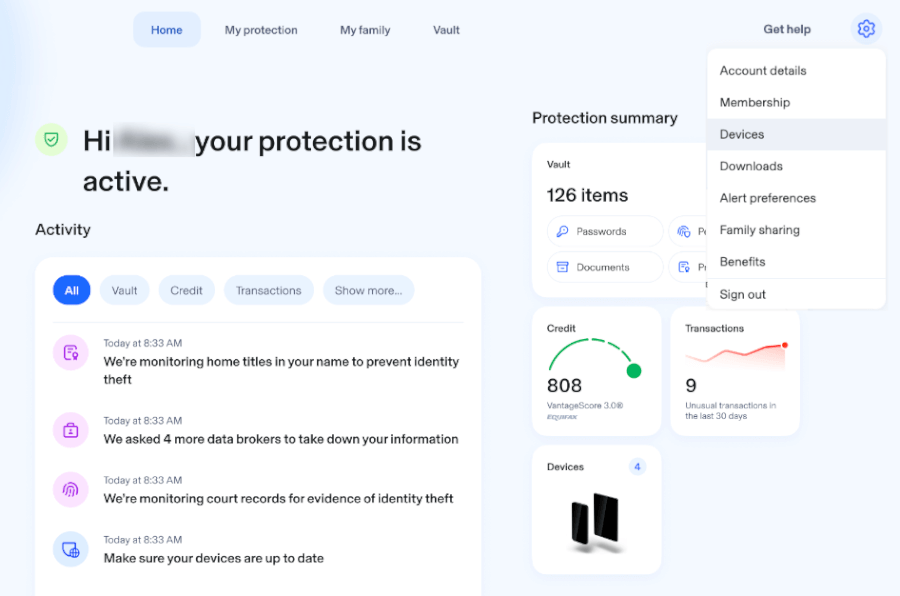
Aura keeps constant watch over your personal and financial information, sending instant alerts if something suspicious pops up. If your identity is ever stolen, you’re covered by up to $1 million in insurance per adult (up to $5 million for families) and get 24/7 access to white-glove fraud specialists who help you recover step by step.
Credit and financial monitoring
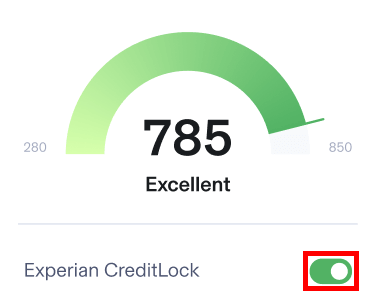
Aura monitors your credit across all three major bureaus (Experian, Equifax, and TransUnion) and flags any new accounts, credit pulls, or unusual activity. You can also lock your Experian file instantly to stop anyone from opening new lines of credit in your name. Meanwhile, your linked bank, credit card, and investment accounts are constantly scanned for suspicious transactions.
VPN and antivirus protection
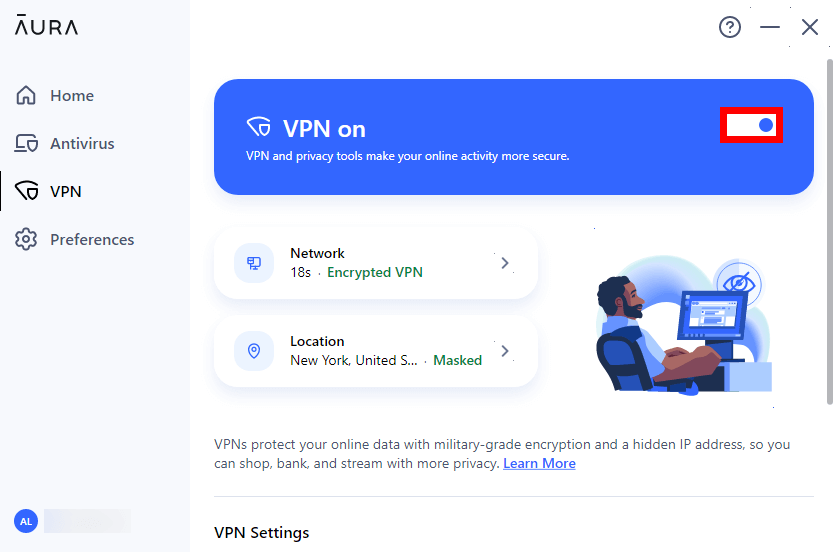
Aura’s military-grade VPN keeps your browsing private and secure, even on sketchy public Wi-Fi. Combined with its built-in antivirus, which blocks malware, ransomware, and phishing attempts, you get rock-solid protection whether you’re streaming, shopping, or just scrolling.
Password manager and secure vault
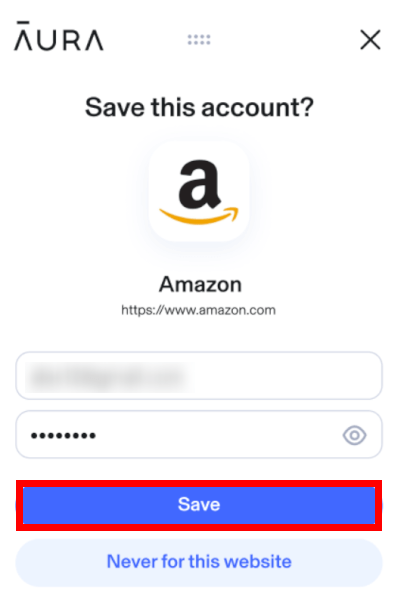
Forget juggling dozens of passwords — Aura’s password manager stores and syncs them safely across all your devices. Sensitive files? Tuck them away in Aura’s encrypted vault, your personal digital lockbox where you can securely store and share important documents with family members.
Ad, tracker, and spam protection
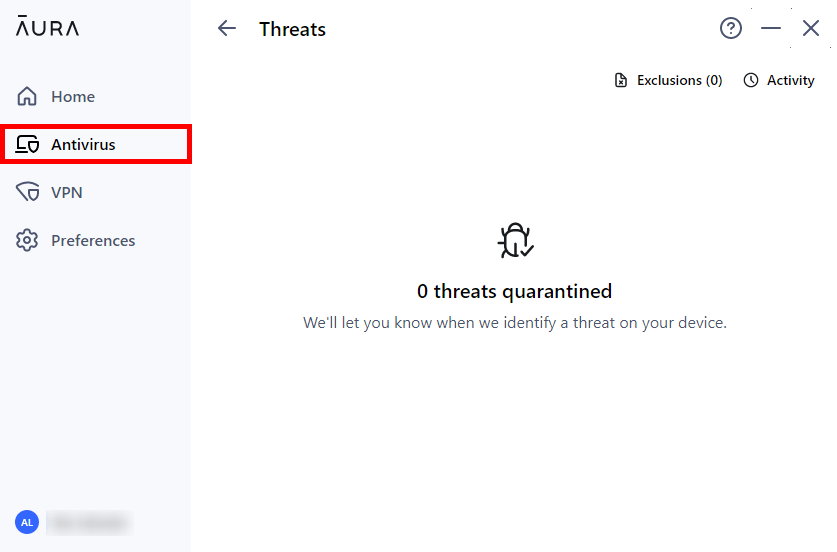
Aura’s privacy tools take aim at online annoyances. Its anti-tracking and ad-blocking extensions stop trackers from following you around the web, while AI-powered spam call protection filters out robocalls and scams before your phone even rings. You can also generate email aliases to shield your real address from leaks and junk mail.
Family safety and child protection
Aura goes beyond adult protection — it’s built for families too. The parental controls let you manage screen time, block inappropriate content, and monitor online activity. Safe Gaming helps spot signs of cyberbullying, and child identity protection keeps kids’ SSNs safe from fraud. Aura even alerts you about registered sex offenders in your area for added peace of mind.
Home and property protection
Aura keeps an eye on your real-world assets too. Home title monitoring alerts you to suspicious changes on your property deed, while auto title monitoring helps prevent car ownership fraud.
Now that we’ve covered Aura, let’s dive into Optery.
Optery’s focused approach
Optery keeps things lean and laser-focused on privacy. While it doesn’t bundle in extras like antivirus or VPN protection, it does offer a free plan that scans for your exposed personal information and shows you exactly which data brokers have it. That transparency gives users a clear starting point for reclaiming their online privacy, even before upgrading to a paid plan.
Ease of use and user interface: Aura’s simplicity vs Optery’s precision
Both Aura and Optery pride themselves on being easy to navigate, but the real difference shows up once you start using them. From setup to dashboards and mobile apps, each service has its own take on convenience.
Getting started: Setup and first impressions
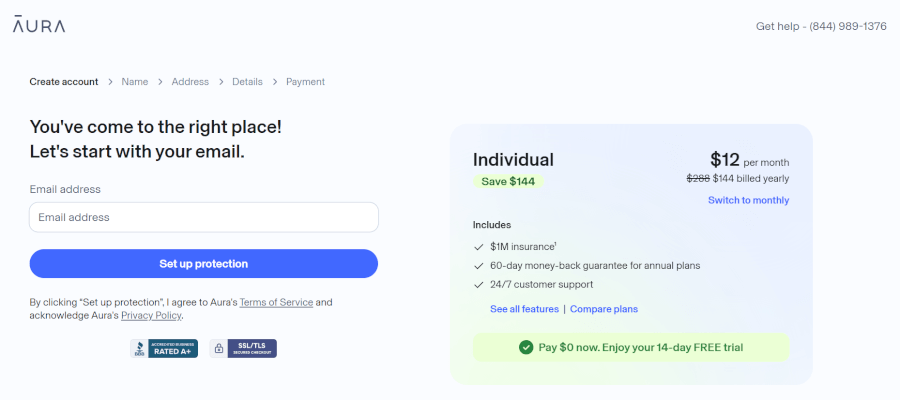
Aura’s setup feels like a one-and-done experience. After signing up for a plan through its website or app, you’re asked to provide some personal details — your full name, address, phone number, date of birth, and Social Security number. It may sound like a lot at first, but it’s all part of ensuring Aura can accurately locate your data across hundreds of broker sites.
Once that’s done, Aura kicks off its automated scan. It quickly maps out where your personal details appear online and starts sending opt-out requests on your behalf. From there, everything runs quietly in the background — no manual submissions, no tedious forms.
If you’re using one of Aura’s all-in-one plans, setup also includes downloading the mobile or desktop app to activate tools like VPN protection, antivirus, and credit monitoring. It’s a quick, centralized setup that gets your entire privacy suite running in minutes.
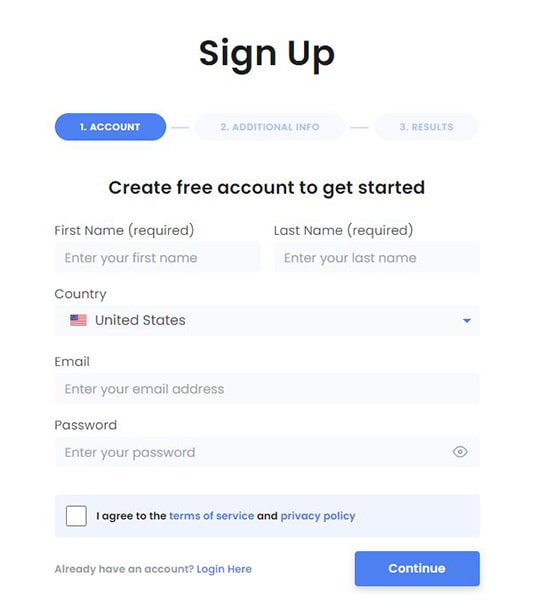
Optery takes a different route, giving users more control right from the start. You can create a free account without even entering your credit card — just your name, city, state, and birth year. Within minutes, Optery generates a personalized Exposure Report showing where your personal information is publicly listed.
From there, you can choose your adventure: Stick with the free plan and manually remove your data using Optery’s direct links to broker opt-out pages, or upgrade to a paid plan for full automation. Paid users get access to “before and after” reports, so you can actually see your data disappear from each site.
You can also add extra details (like old addresses or phone numbers) to improve scan accuracy, giving privacy enthusiasts a more hands-on way to fine-tune results.
Dashboard: Keeping tabs on your privacy
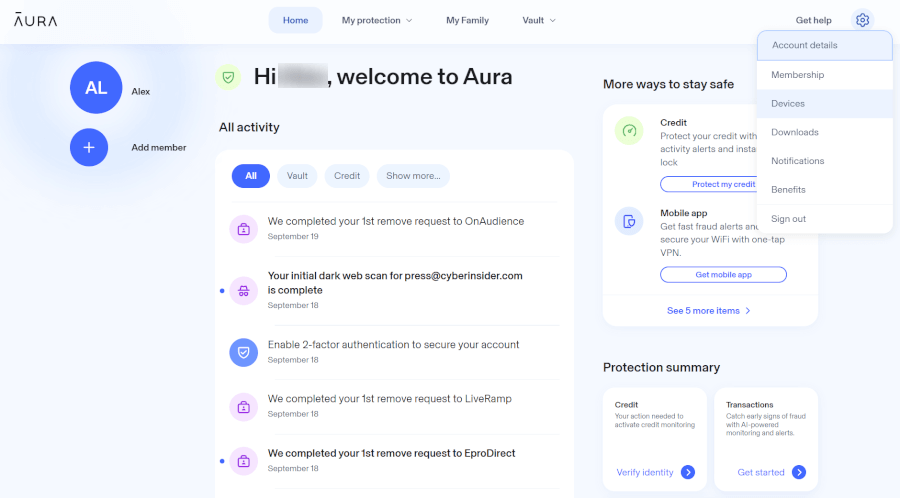
Aura’s dashboard feels like mission control for your entire digital life. From here, you can monitor identity theft alerts, track your credit score, view financial warnings, and yes — keep tabs on your automated data removals. Everything is connected in one place, which makes Aura incredibly convenient if you’re looking for a “single pane of glass” to oversee your online safety.
That said, all this power comes with a small trade-off: The dashboard can feel busy at first. With so many features — antivirus, VPN, password manager, fraud alerts, and more — new users might need a few minutes to get their bearings. Once you do, though, Aura’s clean design and real-time notifications make it easy to see what’s protected, what’s removed, and what needs attention.
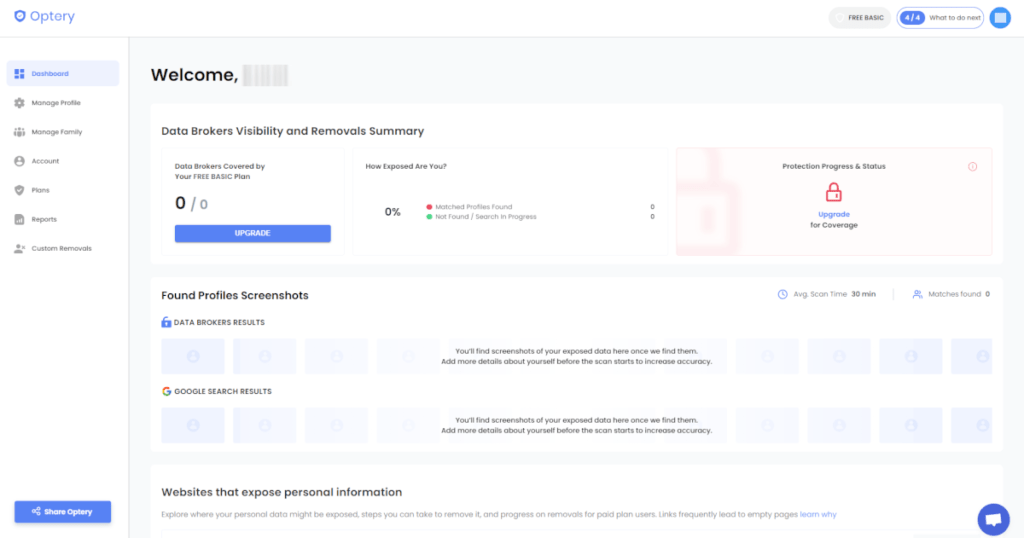
Optery’s laser-focused on data broker removals, showing exactly where your personal information was found and what’s been scrubbed — complete with screenshots for proof.
The interface is minimalist and intuitive, making it simple to navigate even for first-time users. Free plan users get detailed exposure reports and DIY opt-out links, while paid subscribers enjoy automated tracking, monthly updates, and custom removal requests right from the dashboard.
Mobile app experience: Protection vs precision
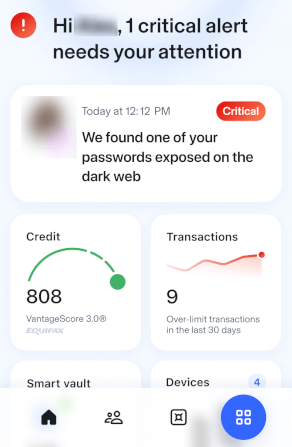
Aura’s mobile app feels like a digital security dashboard in your pocket. From data removals and credit monitoring to VPN access and password management, everything lives under one roof. Alerts about suspicious activity pop up almost instantly, and the sleek design makes it easy to navigate across devices. That said, the sheer number of features can make the interface feel a little crowded at times, and a few users have reported the occasional glitch. Still, it’s one of the highest-rated security apps on both iOS and Android for a reason.
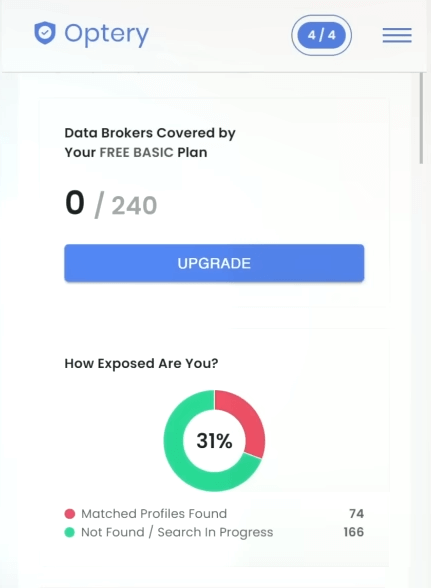
On the other hand, Optery’s app takes a simpler, more targeted approach. It’s built purely for tracking your exposure and managing data removal progress. The dashboard is clean and transparent, showing before-and-after screenshots to confirm removals — a feature privacy enthusiasts love.
The only downside? You’ll need to log in each time you open it, and live support responses can be a bit slow.
Security and privacy: Is Aura or Optery a safer choice?
Both Aura and Optery take data protection seriously. Aura is an all-in-one fortress designed to guard your identity, finances, and devices, while Optery is a surgical tool that focuses purely on making your personal data disappear from broker sites.
| Security and privacy features | Aura | Optery |
| AES-256 encryption (data at rest) | ✅ | ✅ |
| TLS/HTTPS encryption (data in transit) | ✅ | ⚠️ Uses TLS, not AES-256 |
| Zero-knowledge password manager | ✅ | ❌ |
| SOC 2 Type II certification | ✅ | ✅ |
| ISO 27001 certification | ✅ | ❌ |
| GDPR & US state law compliance | ✅ | ✅ |
| Intrusion detection and employee access limits | ✅ | ❌ |
| Privacy policy clarity | ✅ Transparent, all-in-one coverage | ✅ Clear, removal-focused scope |
Aura goes far beyond basic data removal. It’s built as a complete digital security ecosystem, combining strong encryption, identity theft protection, credit and bank monitoring, antivirus, and VPN in one place.
We like that Aura explicitly states it never sells or shares user data — a refreshing level of transparency in a crowded market. Its use of bank-level AES-256 encryption and ISO 27001 certification further adds to its credibility. The inclusion of intrusion detection and strict employee access limits shows that Aura doesn’t just protect users’ data — it protects how it handles that data.
Optery sticks to what it does best — removing your personal information from hundreds of data broker sites with unmatched transparency. Its reports come with screenshots proving where your data was found and confirming when it’s gone, which builds a strong sense of trust.
It’s also fully compliant with major privacy laws like GDPR and CCPA, and its SOC 2 Type II certification shows it takes internal security seriously. However, reviewers have noted that Optery uses TLS for data transmission — a solid but slightly weaker standard than AES-256 — and lacks deeper security measures like intrusion detection.
Customer support and resources: Who has more helpful customer support, Aura or Optery?
| Customer support options | Aura | Optery |
| Phone support | ✅ 24/7 US-based, plus “White Glove” concierge for identity theft victims | ✅ Limited hours, chatbot first, then live agent support |
| Live chat | ✅ Daily, 8 AM–8 PM EST | ✅ 24/7 chat, initially handled by a chatbot |
| Email support | ✅ 24/7 | ✅ 24/7 |
| Help center / FAQs | ✅ Extensive library for self-help | ✅ Comprehensive guides and FAQs |
Support can make or break your experience with a service, and here Aura clearly aims to cover all bases. With 24/7 phone access and chat support, plus a rich help center and FAQ library, you’re never left guessing.
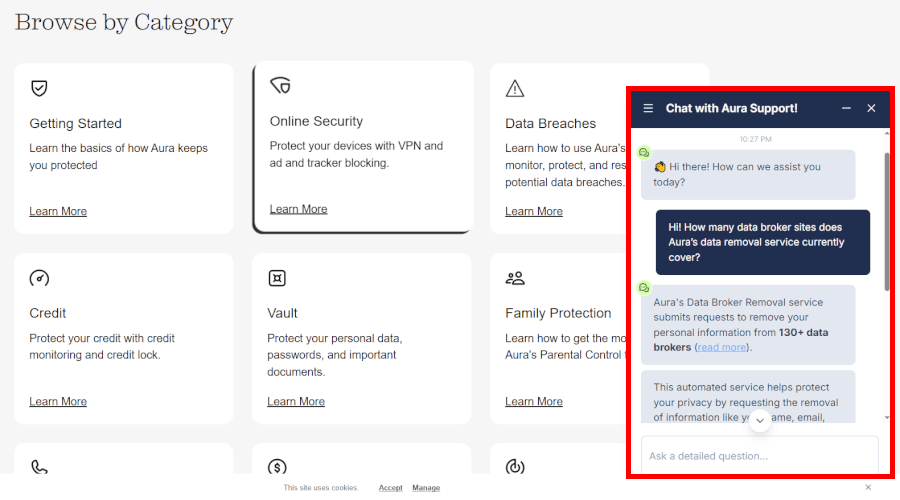
The standout is Aura’s white glove fraud resolution, where certified fraud specialists guide you step by step if your identity is compromised — disputing charges, coordinating with credit bureaus, and even handling government forms. It’s basically a personal safety net when things get tricky.
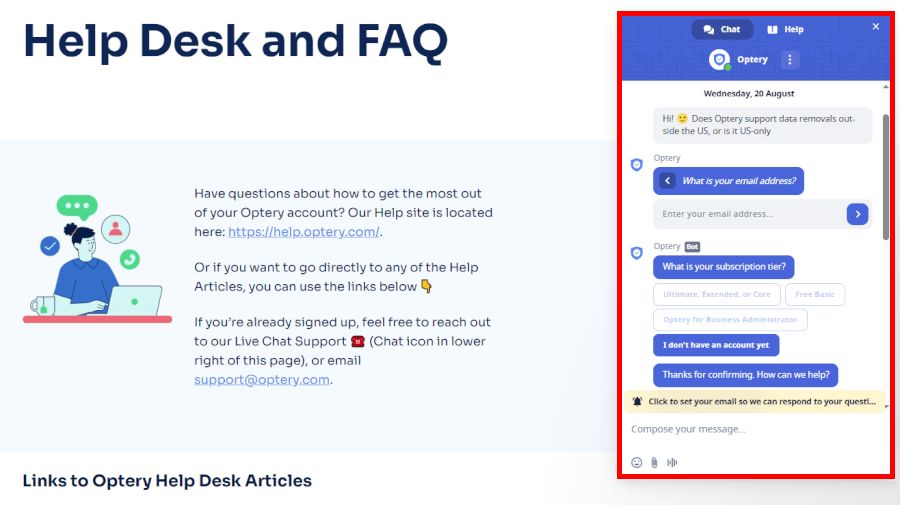
Optery also delivers solid support. The 24/7 chat is a mix of automated and live help, and their FAQ/help desk is detailed and easy to navigate. While you might initially hit a chatbot, a real agent is always just a click away.
In real-world testing, both services responded quickly and knowledgeably. But for anyone looking for the most comprehensive safety net — especially if identity theft ever becomes an issue — Aura’s around-the-clock, hands-on approach gives it the edge.
Plans and pricing: Does Aura or Optery offer greater value for money?
Aura bundles data removal with full-scale digital protection tools, while Optery focuses purely on removing your personal information, making it a more budget-friendly but narrower option.
| Aura | Optery | |
| Starting price | $12/month ($9 with coupon) | $3.25/month |
| Plan types | Individual, couple, family | Free, premium, business |
| Coverage | Data removal, identity theft protection, credit monitoring, VPN, antivirus, password manager | Data removal only (up to 645+ broker sites) |
| Family coverage | ✅ Up to 5 adults and kids with unlimited devices | ❌ No family plan |
| Refund policy | 60-day money-back guarantee (annual plans) | 30-day money-back guarantee |
Aura’s plans may come at a premium, but they also deliver a premium experience. No matter which tier you choose, you get the full suite of protections: automated data removal, credit and bank monitoring, dark web alerts, VPN, antivirus, and even a zero-knowledge password manager. It’s a true “set it and forget it” kind of protection that covers every part of your digital life.
| Aura plans | Individual | Couple | Family |
|---|---|---|---|
| 1-month | $12.00/month | $20.00/month | $30.00/month |
| 1-year | $9.00/month | $17.00/month | $25.00/month |
Deal: Get 68% discount on Aura's yearly plans >
The “Individual” plan works perfectly for solo users, while the “Couple” plan doubles the coverage and protection limits for two adults. The “Family” plan stands out for its unlimited child monitoring and up to 50 connected devices, which is rare in this space. Aura also backs everything with a 60-day money-back guarantee, one of the longest in the industry.
The only catch? Renewal prices jump after the first year — sometimes by as much as 40%. So if you like Aura’s all-in-one setup, it’s smart to lock in the promotional rate early or grab a discounted annual plan.
Optery takes the opposite approach — affordable, transparent, and flexible. You can start completely free with the “Basic” plan, which scans for your exposed data and provides opt-out instructions. If you’d rather not do the manual work, paid plans like “Core”, “Extended”, and “Ultimate” automate the entire process.
| Duration | Core | Extended | Ultimate |
| 1-year | $3.25/month | $12.42/month | $20.79/month |
| 1-month | $2.09/month | $14.99/month | $24.99/month |
The “Core” plan covers over 110 sites, while the “Extended” plan pushes that number to around 275. For those who want the most thorough cleanup possible, the “Ultimate” plan targets 385+ brokers and includes custom removal requests — perfect for privacy enthusiasts who don’t want to leave any trace online.
Even better, every paid tier comes with a 30-day money-back guarantee, so you can test the waters without commitment. The main drawback? There’s no family plan, and the free version requires manual removals, which might not appeal to users who prefer a hands-off approach.
Optery vs Aura: Best choice for data removal and identity safety?
Both Aura and Optery take your privacy seriously, but they go about it in very different ways. Optery targets data removal with precision, whereas Aura combines it with identity, device, and financial protection. Here’s how they stack up:
- Trustworthiness: Tie – Aura builds on a proven cybersecurity foundation, while Optery wins points for transparency and its clear removal reports. Both inspire confidence, just in different ways.
- Availability: Optery – With coverage extending into Canada and business plans abroad, Optery has a slight edge for international users.
- Features: Aura – Aura offers a full digital safety net — data removal, identity theft protection, VPN, antivirus, and credit monitoring — all under one roof.
- Ease of use: Aura – Aura’s unified dashboard and automation make privacy management feel effortless. Optery’s interface is simple but more focused on removals only.
- Security and privacy: Aura – It layers AES-256 encryption, ISO 27001 certification, and intrusion detection, while Optery keeps its focus on GDPR-compliant data removals.
- Customer support and resources: Aura – With 24/7 phone, chat, and email support — plus its “White Glove” fraud resolution — Aura clearly goes the extra mile.
- Plans and pricing: Aura – Optery is the more budget-friendly choice for removals only, but Aura delivers far more value through its all-in-one coverage and protection tools.
If you only care about deleting your personal info, Optery nails it — it’s focused, effective, and easy on the budget. But Aura steals the show with a full suite that automates privacy, secures your devices, and backs you up with real human support.
Other data removal guides:
- Best Data Removal Services
- Incogni Review
- Optery Review
- DeleteMe Review
- Privacy Bee Review
- Privacy Bee vs Incogni
- Incogni vs DeleteMe
- Optery vs DeleteMe
- How to Delete Your Digital Footprint
- How to Delete Yourself from the Internet
- How to Massively Reduce Junk Email and Spam
- How to Not Get Doxxed
- How to Opt Out of Whitepages
- How to Stop Spam Calls and Robocalls
Aura vs Optery FAQ
Which is more secure, Aura or Optery?
Aura takes the lead when it comes to all-around security. It goes beyond data removal with bank-level AES-256 encryption, identity theft monitoring, credit protection, antivirus, and a built-in VPN. Optery also takes privacy seriously — it’s SOC 2 Type II certified and compliant with major laws like GDPR and CCPA — but it doesn’t include the extra security tools that make Aura a full-circle protection suite.
How do Aura and Optery compare on data broker coverage?
Optery wins here with its massive broker list — over 385 sites on its “Ultimate” plan and even more for custom removals. Aura’s data removal tool covers fewer brokers but balances that with automation and integration into a wider security ecosystem. So, if you only care about erasing your data footprint, Optery’s your pick. But if you want that plus identity and device protection, Aura’s the smarter investment.
What features make Aura worth the higher cost over Optery?
Aura packs a lot into one subscription — identity theft protection, credit and bank monitoring, VPN, antivirus, password manager, and parental controls, on top of automated data removal. You’re essentially getting several premium services bundled into one. Optery, while cheaper and laser-focused on removals, doesn’t offer this all-in-one protection. For many users, Aura’s higher price simply buys more peace of mind.
In what countries are Aura and Optery available?
Aura primarily serves users in the United States, where it offers its full suite of identity protection tools and insurance coverage. Optery, on the other hand, has slightly broader availability and supports Canada as well. Neither service is truly global yet, but Optery gets a small edge if you’re outside the US.
Is Aura or Optery more user-friendly for beginners?
Aura wins for overall ease of use. Its dashboard brings all your tools together — from monitoring alerts to data removals — in a clean, well-organized interface. The mobile app is smooth and intuitive, too. Optery’s platform is straightforward, but it leans more toward tech-savvy users who want to dive into data removal reports and manual controls.

Leave a Reply